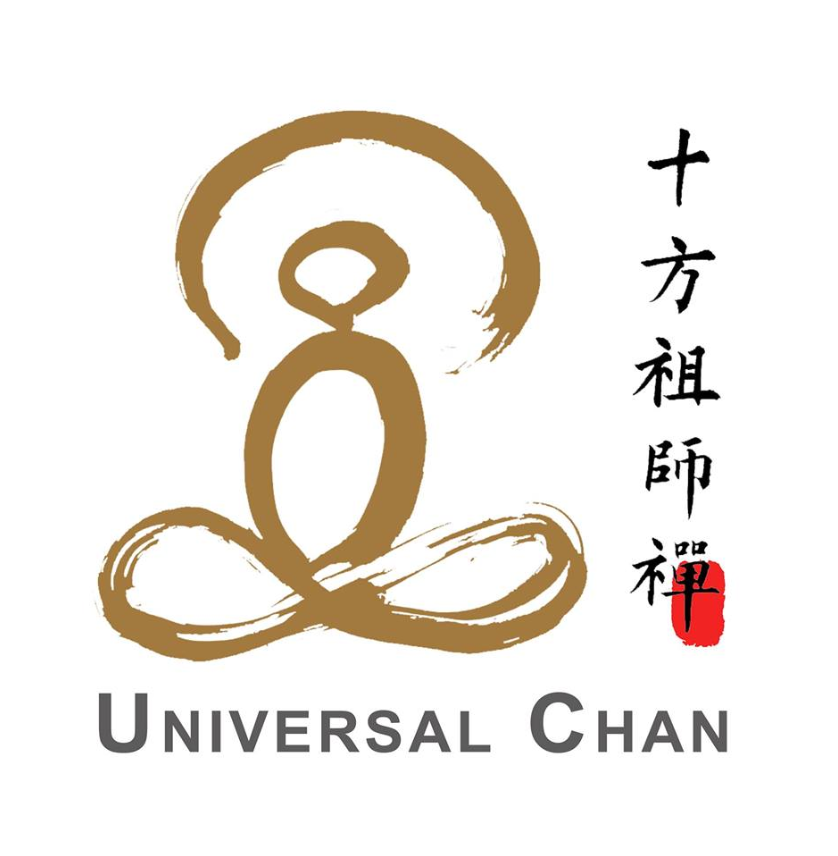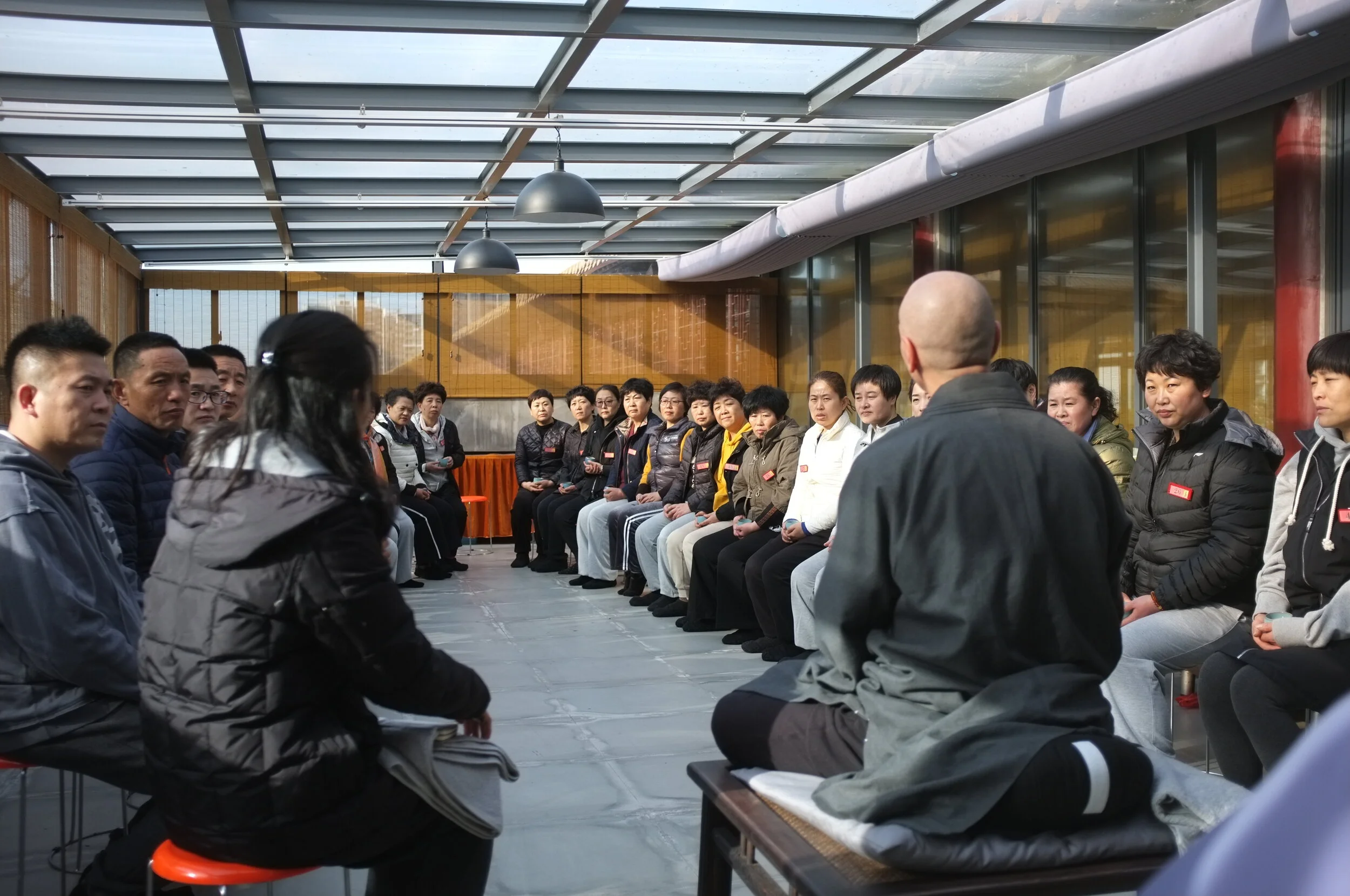Activities
Chan (Chinese ‘禪’) is a living instant by instant fresh practice completely connected with our daily activities.
At Universal Chan we do a wide variety of activities ranging from the widely practiced ones carried out in many Buddhist centers, to the lesser known methods specific to our organization.
The Chan Teacher (Shifu) employs many methods of Buddhism that appropriately fit each practitioner according to their different cultural backgrounds, experience, and physical conditions.
What Kinds of Classes Can We Provide?
We can provide different kinds of classes which are tailored to different situations, including regular classes at our Center and hosting classes for companies and organizations:
1. Lectures on the principles and insight of the Chan tradition of Chinese Buddhism to help students establish the right view of the practice. The right view is very important, just as GPS is to prevent us from going astray.
2. Meditation Class incorporating sitting meditation, walking meditation, and some exercises, with an emphasis on properly using the meditation method to train our mind and how to expand the technique to daily activities so as to live our life more at ease.
3. Meditative Tea Tasting Class combines guided meditation with tasting different varieties of premium tea. In the class, tea can play multiple roles: a medium to unite body and mind and bring us to appreciate the present moment; a marvelous healthy drink with numerous aromas, colors, and flavors; and a silent friend to unveil the truth and exchange profound thinking.
4. Tea Tasting Presentation at fairs to provide some glimpse of tea culture.
5. Casual Tea Gathering for people to share some harmonious time together, enjoy tea, and build bonds.
6. Dynamic Chan Classes include a wide variety of exercises or dynamic activities combined with Chan mind training.
7. Outdoor Classes: we have Hiking Chan, Exercise Chan, Sitting Chan, or a combination of these.
8. Online Classes in English and bilingual (Chinese-English)
9. TeaCal Class: A specific regular course for University of California, Berkeley students
10. Tai Ji Quan and Qi Gong Classes
11. Chan Retreats
12. Chan Recitation Retreats
13. Working Activities Retreats
14. Chan in Daily Life Retreats
Uniqueness of our Meditative Tea Tasting Teaching
Originating in China thousands of years ago, tea has become one of the most popular aromatic and healthy beverages in today’s world. However, beyond its physical benefits, tea can also bring invaluable cultural and spiritual value to our life.
In the Chan tradition of Chinese Buddhism, tea plays a significant role in meditation practice, as a saying goes in Chinese – tea and Chan taste the same (禪茶一味). With the adoption of the wisdom from Chan Teachings, tea can be a very effective, expedient way to help people understand and engage in the meditation practice so as to get some benefits.
Through our deep and wide connection with China, we have access to many varieties of premium tea which enable us to seamlessly combine the value of tea and wisdom of Chan in our teaching. Through some guided meditation practice in the class, even beginners can have some experience of the calming down of body and mind and improvement of awareness with more sensitivity to the aroma and taste of the tea, which can enable them to better enjoy this healthy drink and the peaceful present moment. At the same time, through training to drink tea in a meditative state, our mind will gradually be softened, allowing us to better appreciate the beauty of tea. Such practices will also help us to have a glimpse of how our mind works so as to better understand the principle of meditation practice. With the deepening of the practice, the principles and method can be easily expanded to our daily activities to further enhance our life so that we can all be more happy, free, and at ease in any situation.
Chan Retreats
We provide retreats of different time lengths to beginners, advanced practitioners, and monastics to help participants deeply engage in various techniques.
We use the 2 most efficient methods of practice: Hua Tou (a deep questioning) and Mo Zhao (Silent Illumination).
During the retreats, participants may be involved in working, exercising, sitting, walking, and bowing periods to enable them to use the Chan principles in daily life more efficiently.
Recitation Retreats
We recite Buddhas and Bodhisattvas’ names and mantras, but we will still maintain the Chan principles.
1 to 5 days and longer retreats are available.
The set up can vary according to the length of the retreat and the skills of the participants. General schedule involves recitation while standing, sitting, bowing, and working throughout the retreat.
Chan In Daily Life
Although the other retreats will include the daily life practice, here this aspect is emphasized so that the chores and other daily activities are the predominant aspect of the retreat.
Still, we will carry on a part of formal practice like Sitting Chan, Walking Chan, etc.
Hiking Chan
For people who particularly like outdoor practice, we offer daily or longer Hiking Chan Retreats where the walking is the prevalent part, while also implementing Sitting Chan, Exercise Chan, and other methods.
Different retreats are set up according to the age and physical conditions of the individuals.
Tea Chan
From about 1500 years till this day, Tea in China has walked in parallel with and has been strictly connected to Chinese Chan. It is not surprising that many Great Chan Masters used tea as a tool to teach their students. It is, in fact, rare to find a Chinese Monastery where tea is not served. The Chan Tradition is then spread widely and consistently together with the appreciation of tea. During the practice, we follow the Chan Principles by providing participants with proper instructions, while guiding them to enjoy a few cups of good tea.
Da Xing Fa Shi has been teaching the Tea Chan method in different countries for many years.
Fruit Chan
Fruit Chan is a useful, original, and creative method to introduce and deepen the understanding of the Buddha’s teachings by tasting fresh fruits and applying the principles of Chan.
Da Xing Fa Shi ‘s Fruit Chan has its special and unique taste!
Dynamic Chan
Another good Dharma Tool is to use Chan Principles while doing exercises and other dynamic activities.
Here also we will learn how to carry on our Chan practice without interruptions while exercising. This is one of the most commonly used tools in different retreats.
We will perform sitting exercises, standing exercises, and laying down exercises, different forms but with a single taste.
Bowing Chan
The Bowing Chan is a unique way of bowing.
It’s a practice itself and an implementation of other practices. It is doable in almost any kind of environment, particularly at home, and crucial to maintaining a healthy body and mind.
When we bow going down and touching the floor with the forehead using the Chan wisdom, we are quite in accord with the ultimate principle of our inherent nature.









